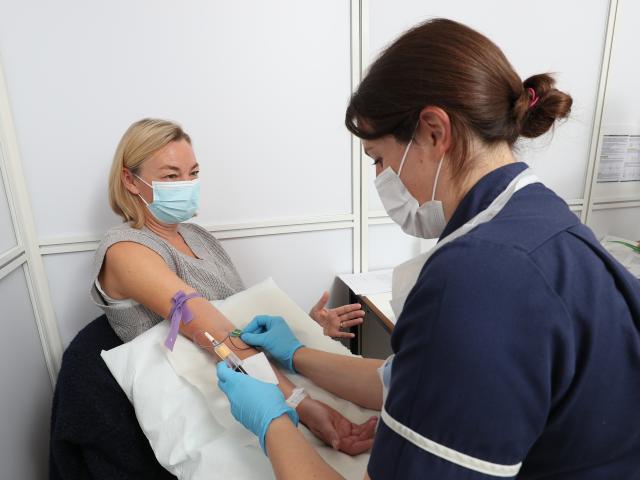
Study supported by Wrexham volunteers publishes COVID-19 Booster data
3 December
Six COVID-19 vaccines are safe and boost immunity for people who have had two doses of AstraZeneca or Pfizer-BioNTech, results from the UK-wide COV-BOOST trial show.
The world-first study, for which Public Health Wales recruited volunteers at the North Wales Clinical Research Facility, Wrexham Maelor Hospital for, was key to shaping the UK booster programme and gives vital evidence for global vaccination efforts. The study has had its latest results published in the Lancet.
The trial is one of many COVID-19 studies taking place across Wales.
Impactful data insights
COV-BOOST looked at the safety, immune responses and side-effects of seven vaccines when used as a third, booster jab. 164 volunteers joined the study from across the Wrexham area.
Run at 18 sites across the UK, the study saw 2,878 people aged 30 or over recruited overall. Participants received one of these boosters 10-12 weeks after their initial two-dose vaccination with either AstraZeneca or Pfizer-BioNTech. A control group was given a meningitis vaccine, to account for reactions not specific to the COVID-19 jabs
The seven vaccines trialled were:
- AstraZeneca-Oxford
- Pfizer-BioNTech
- Moderna
- Novavax
- Valneva
- Janssen
- CureVac
Of these, only AstraZeneca, Pfizer-BioNTech, Moderna and Janssen are currently licensed for use in the UK. Half-doses of Pfizer-BioNtech, Novavax and Valneva were also tested.
Full details of the trial results can be found on the National Institute for Health Research website.
Dr Orod Osanlou, Consultant Physician and Principal Investigator for Public Health Wales and the COV-BOOST study said:
“We are proud that the North Wales Clinical Research Facility has supported such an important, world-first study. This will inform the future rollout of the COVID-19 vaccination programme across Wales and internationally.
“I would like to thank all of our study participants and staff across Betsi Cadwaladr University Health Board who made this research possible, contributing to the UK-wide effort to tackle the pandemic.”
Dr Nicola Williams, Director of Support & Delivery at Health and Care Research Wales:
“As we approach winter months, and face the uncertainty of new variants, these results couldn’t be timelier.
“This study is one of many vaccine trials Wales is delivering to help inform the UK vaccine programme and we will continue to support the COV-BOOST study going forward to help answer more of the big questions in our national response to COVID-19.”
Contributing to future research
COV-BOOST was designed so that stored samples can be used in evaluating these vaccines’ effectiveness in neutralising any new variants of concern, and COV-BOOST samples have been made available to UKHSA for testing against omicron.
There will also be investigation into whether a longer period between second and third doses improves response to the two of the booster vaccines. Several studies have shown this effect between first and second doses. Some original control participants in the study received the booster at a later point, and the results are expected to be available in the new year.